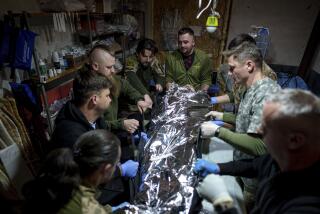Russian Troops Reclaim Body of Missing Officer
- Share via
MOSCOW — Russian forces in Chechnya said they had found and retrieved the body Sunday of a top general from the rubble of a collapsed building, five days after he went missing during fierce street battles in Grozny, the capital of the rebel republic.
The disappearance of Gen. Mikhail Malofeyev on Tuesday and the military command’s inability to confirm whether he was dead or captured had become a vivid illustration of how Russia has lost the upper hand in its war to regain control of the separatist territory.
In recent days, fighting has intensified throughout Grozny as Russians and Chechens have battled block by block and building by building. Each side has repeatedly claimed control of various districts or sites, and the contradictory reports have created strong suspicions that neither side is making significant gains or telling the truth.
Although the Russians continue to rely heavily on their superior firepower--using aerial bombardments and long-range artillery--they are increasingly being drawn into the kind of close, bloody street combat that they would rather avoid and at which the Chechens excel.
Malofeyev, who as deputy commander of the northern front was one of the six highest-ranking generals in Chechnya, appears to have been killed during just such an engagement. Russian officials say he had taken command of a small group of Interior Ministry troops, trying to spur them into battle, when he was shot in the head by a Chechen sniper.
“He behaved as a hero and, when an assault team of the Interior [Ministry] troops tarried, led a small group forward so that the main forces could act,” Col. Gen. Viktor Kazantsev, commander of Russian forces in Chechnya, told the Interfax news agency. The general “was wounded in his head. The bandits opened grenade-thrower and mortar fire, and a wall collapsed over the heads of the general’s group.”
Russian troops fought for days to reclaim control of the battle site and then dug through the rubble for more than a day before locating the bodies of Malofeyev and his sergeant, officials said. The bodies were reportedly flown late Sunday to a military facility in the southern city of Vladikavkaz, the capital of North Ossetia.
Last week, Chechen fighters claimed to have taken Malofeyev prisoner and even alleged that they had interrogated him and learned details of Russian troop deployments and morale problems.
Chechen officials did not recant those reports Sunday or remove an account of the general’s “interrogation” from their Web site, https://www.kavkaz.org. But the Chechen report obliquely supported the Russian version of events by asserting that one sign of deteriorating Russian morale is that generals are being forced to lead small infantry units into battle.
Russian forces began moving into Chechnya on Sept. 30 after two rebel incursions into the neighboring region of Dagestan and a series of bomb blasts in Moscow and elsewhere in Russia that killed more than 300 people had turned public anger against the Chechens. The southern republic had enjoyed de facto independence since its 1994-96 war of secession ended in a stalemate.
Russian officials vowed not to repeat the mistakes they made in their first military campaign to tame the rebellious region, asserting that they would not storm Grozny or be drawn into protracted guerrilla warfare. But the war does not seem to be proceeding either the way they wanted or as well as they predicted.
Television footage of Grozny indicates that most buildings have been reduced to little more than cement husks. Between 8,000 and 25,000 civilians are believed to be trapped, too feeble or fearful to flee. While both sides tend to claim no more than a handful of combat deaths a day, reports from the area make it clear that the death tallies are mounting fast.
On Saturday, Russia’s acting president, Vladimir V. Putin--whose own political fortunes are believed to depend on a successful prosecution of the war--removed Col. Gen. Vyacheslav Ovchinnikov, the commander of Interior Ministry troops in Grozny. Ovchinnikov was replaced by a veteran commander from the 1994-96 Chechen war, Col. Gen. Vyacheslav Tikhomirov.
“There have not been any serious complaints about the actions of the military,” Putin insisted Sunday in a TV interview. “And if the operation is continued as it is now, there aren’t going to be any in the future either.”
However, some observers suggest that there is growing frustration in the Kremlin over the lack of progress in Grozny. And public confidence in the government’s version of the war is eroding.
Russian and foreign media outlets have been drawing increasing attention to the Russian government’s low military death counts, which total between 700 and 800. Several human rights groups and news organizations are conducting independent tallies, and some estimates put the number of Russian soldiers killed at no fewer than 3,000.
Russia’s only independent national TV network, NTV, broadcast a detailed report Sunday that said anywhere from a dozen to several dozen bodies a day were being handled at facilities at Rostov-on-Don.
In an apparent effort to reassert control over media coverage, Putin last week rehired a heavyweight media spin doctor, Sergei V. Yastrzhembsky, to oversee war coverage. Yastrzhembsky made a name for himself by serving for years as press spokesman for former President Boris N. Yeltsin, whose verbal gaffes were legendary.
Yastrzhembsky’s posting is even more notable because he was unceremoniously fired by the Kremlin in September 1998 and has since worked for one of its political foes, Moscow Mayor Yuri M. Luzhkov.
More to Read
Sign up for Essential California
The most important California stories and recommendations in your inbox every morning.
You may occasionally receive promotional content from the Los Angeles Times.













